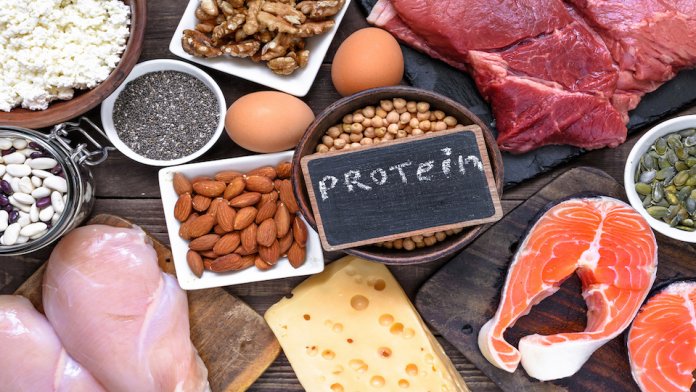When I saw an advertisement for protein-enriched water, I knew that we had finally reached a tipping point. We have become totally protein obsessed. There are three foundational macronutrients: Carbohydrate, Fat, and Protein. When it comes to carbohydrate and fat, even people with entry-level nutrition knowledge can agree that there are “good” and “bad” versions. (Pinto beans and jelly beans are both high in carbs, doughnuts and walnuts are both high in fat.) But protein reigns supreme…as if it is all created equal and as if we could all benefit from eating more. Well, my team at UpWellness has some news for you…
Enjoy,
-JL
Protein is definitely a buzzword these days. Protein shakes, bars, pills, and protein-heavy diets are all the rage, with the global protein market bringing in billions of dollars every year. Many Americans seem to think that they’re starved for protein and reach for supplementary sources to fill this void in their diet. The truth is far more complicated and individualistic than you may think.
What exactly is protein?
If you’ve ever read anything about diet, nutrition, or even had the slightest interest in eating a balanced diet, you’ve certainly heard the word “protein” more times than you care to count. This word is thrown around so much to the point where it has actually started to lose its meaning.
To put it simply, protein is one of the three macronutrients, including carbohydrates, protein, and fat. These macronutrients are essential for health and crucial components of a well-balanced diet. Unlike the other macronutrients, protein is often overemphasized, with marketing campaigns designed to sell you on the idea that it is all you need for bigger muscles, weight loss, and overall health.
Of course, protein does play an important role in the body; it can improve connective tissue, strengthen your hair and bones, help you lose weight (along with exercise), and aid in muscle development. However, many people elevate protein to the level a nutritional cure-all. Rather than simply focusing on protein alone, you need to maintain a balanced diet and avoid unhealthy sources of artificial protein.
Benefits of protein
Help you gain muscle
Protein is the core component of muscle and is crucial for increasing strength and muscle mass during exercise. Remember, you’re not merely going to be able to chug a protein shake and then wake up with ripped biceps the next day. Maintaining a diet rich in healthy sources of protein aids in muscle development from regular strength-training exercise.
Reduces hunger
Empty carbs from unhealthy sources like pasta and bread may help you feel full in the moment, but will quickly prove unsatisfactory and won’t keep your stomach from growling just an hour after your meal. Protein-rich foods help keep you full by reducing the hunger hormone ghrelin and allow you to feel more satisfied while eating less.
It’s about quality, not quantity
Like most things in life, quality over quantity is an appropriate phrase when it comes to protein. It is not about how many grams of protein you are eating. What is more crucial is where you’re getting your protein from. If you eat a lot of heavy red meat, sugary protein shakes, or protein bars that are practically candy, you’re doing it wrong. Contrary to what the media wants you to believe, America is not going through some massive protein-deficiency crisis. In fact, the average American gets plenty of protein in their diet, just not necessarily from the right sources.
Remember, it’s not just protein that is important; it is the overall vitamins, minerals, and nutrients that you get from your food.
Always eat real, organic food and cultivate a well-rounded diet full of these protein-rich foods:
- White fleshed fish
- Plain Greek yogurt
- Beans, peas, lentils
- Eggs
- Chia seeds
- Natural peanut butter
- Chickpeas
- Chicken
- Almonds
- Oats
- Broccoli
- Spinach
- Quinoa
- Turkey
Everyone is different
We always say that there is no such thing as a “one size fits all” diet. This applies to protein consumption as well. If you are active and work out a lot, you will need more protein than someone who lives a very sedentary life. Current research places the suggested minimum daily protein intake at 56-91 grams of protein for men, 46-75 grams for women. Of course, this is a broad scope, so it is crucial to examine your dietary needs and lifestyle.
Though we may not be going through a protein crisis, we are going through a nutrient crisis. With easy, ready-made, prepackaged meals taking center stage in this fast-paced world, it is becoming more and more unusual to spend time actually preparing real, whole food. Take the time to think about what you are eating and focus on plant-based food and healthy sources of protein.
-The UpWellness Team


